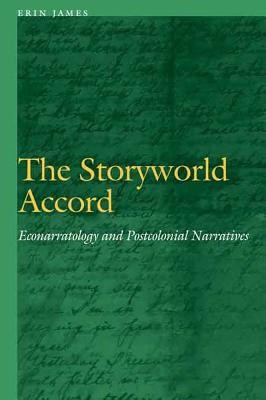
- We will send in 10–14 business days.
- Author: Erin James
- Publisher: University of Nebraska Press
- ISBN-10: 0803243987
- ISBN-13: 9780803243989
- Format: 15.2 x 22.9 x 2.1 cm, hardcover
- Language: English
- SAVE -10% with code: EXTRA
Reviews
Description
"Storyworlds," mental models of context and environment within which characters function, is a concept used to describe what happens in narrative. Narratologists agree that the concept of storyworlds best captures the ecology of narrative interpretation by allowing a fuller appreciation of the organization of both space and time, by recognizing reading as a process that encourages readers to compare the world of a text to other possible worlds, and by highlighting the power of narrative to immerse readers in new and unfamiliar environments. Focusing on the work of writers from Trinidad and Nigeria, such as Sam Selvon and Ben Okri, The Storyworld Accord investigates and compares the storyworlds of nonrealist and postmodern postcolonial texts to show how such narratives grapple with the often-collapsed concerns of subjectivity, representation, and environment, bringing together these narratological and ecocritical concerns via a mode that Erin James calls econarratology. Arguing that postcolonial ecocriticism, like ecocritical studies, has tended to neglect imaginative representations of the environment in postcolonial literatures, James suggests that readings of storyworlds in postcolonial texts helps narrative theorists and ecocritics better consider the ways in which culture, ideologies, and social and environmental issues are articulated in narrative forms and structures, while also helping postcolonial scholars more fully consider the environment alongside issues of political subjectivity and sovereignty. Erin James is an assistant professor of English at the University of Idaho and has published essays in the Journal of Commonwealth and Postcolonial Literature, Journal of Narrative Theory, The Bioregional Imagination, and Teaching Ecocriticism and Green Cultural Studies.
EXTRA 10 % discount with code: EXTRA
The promotion ends in 19d.11:34:21
The discount code is valid when purchasing from 10 €. Discounts do not stack.
- Author: Erin James
- Publisher: University of Nebraska Press
- ISBN-10: 0803243987
- ISBN-13: 9780803243989
- Format: 15.2 x 22.9 x 2.1 cm, hardcover
- Language: English English
"Storyworlds," mental models of context and environment within which characters function, is a concept used to describe what happens in narrative. Narratologists agree that the concept of storyworlds best captures the ecology of narrative interpretation by allowing a fuller appreciation of the organization of both space and time, by recognizing reading as a process that encourages readers to compare the world of a text to other possible worlds, and by highlighting the power of narrative to immerse readers in new and unfamiliar environments. Focusing on the work of writers from Trinidad and Nigeria, such as Sam Selvon and Ben Okri, The Storyworld Accord investigates and compares the storyworlds of nonrealist and postmodern postcolonial texts to show how such narratives grapple with the often-collapsed concerns of subjectivity, representation, and environment, bringing together these narratological and ecocritical concerns via a mode that Erin James calls econarratology. Arguing that postcolonial ecocriticism, like ecocritical studies, has tended to neglect imaginative representations of the environment in postcolonial literatures, James suggests that readings of storyworlds in postcolonial texts helps narrative theorists and ecocritics better consider the ways in which culture, ideologies, and social and environmental issues are articulated in narrative forms and structures, while also helping postcolonial scholars more fully consider the environment alongside issues of political subjectivity and sovereignty. Erin James is an assistant professor of English at the University of Idaho and has published essays in the Journal of Commonwealth and Postcolonial Literature, Journal of Narrative Theory, The Bioregional Imagination, and Teaching Ecocriticism and Green Cultural Studies.


Reviews